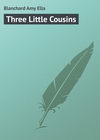Kitabı oku: «The Four Corners Abroad», sayfa 13
CHAPTER XVI
HERR GREEN-CAP
Although Nan's responsibilities did seem heavier after the departure of her mother and aunt, the fact that they were shared in a measure by Mrs. Hoyt and Fräulein Bauer as well as by Dr. Paul, made them seem less. To Dr. Paul Nan poured out her confidences in the most artless manner, and he responded as any considerate older brother might have done. There was plenty of work for all to do, for beyond the demand of music, Nan had her German and other studies in which Mary Lee shared. Jo, though doing well in most directions, floundered terribly when it came to German accent and pronunciation. Fortunately Fräulein Bauer was herself North German, and so was the teacher under whom Jo studied, so she did not fall into a very pronounced dialect, and she comforted herself by saying: "My exams will be written and not spoken, so I think I shall pass all right." Jack cheerfully plunged in with a reckless disregard of anything but making herself understood, and consequently gained a large vocabulary, while Jean, more timid and self-conscious, depended upon her twin when it came to an emergency.
Jo, who had been the life of Miss Barnes's boarding-school, was much more subdued here in Germany. It seemed to be borne in upon her that this was the opportunity of her life, and she must make the most of it. She had never studied very hard before, but being naturally bright, had depended upon a good memory and sudden inspiration to cope with the occasion.
The girls had received Christmas letters from all their late schoolmates, telling of the little events which they knew would interest them on the other side of the water. Charlotte Loring's was the longest; Daniella's the most vividly interesting, for the latter had a picturesque way of presenting things, born of her early free life in the Virginia mountains. There had been, too, letters from home, from Cousin Polly Lewis, telling of her approaching marriage, from Gordon and his brother, from Phil, and last of all from Aunt Sarah, giving the intimate details of home life which brought the brown house and its inmates very distinctly before them.
And now there were three months of hard study before them, interspersed with such pleasures as skating in the Englischer Garten, visits to some specially interesting place, like the great foundry where had been cast such famous works as the great doors of the Capitol at Washington, and numerous world-renowned statues. For Nan there were always opera and concerts as often as practicable, and if Fräulein Bauer could not go with her, Mrs. Hoyt was generally ready. Failing her, Dr. Paul would be called up, and it was seldom that he could not set aside all else in order to act as escort. There were merry doings, too, in Mrs. Hoyt's sitting-room, walks on the Parada to hear the band, expeditions to the Isarthal, or the beautiful Starnberger See when a brisk walk over snowy paths brought them all back ready to attack a supper which, even when wurst appeared as its principal dish, seldom failed to satisfy.
Strange to say, it was not Jack nor Jean about whom Nan finally felt a certain anxiety, but it was Jo. Had it been one of her own sisters, if she could not have laid the matter before Mrs. Hoyt, Nan could have consulted Dr. Paul, but she felt a certain hesitancy in discussing Jo with any one but Mary Lee who was the first to discover that all was not right and who came to her sister in great perplexity.
"Nan," she said, "I think we ought to do something about Jo."
Nan, who was puzzling out a difficult passage in her translation, stopped short. "What do you mean, Mary Lee?" she said.
"Where are the twinnies?" asked Mary Lee, looking around.
"Gone with Mrs. Hoyt to the Englischer Garten. Jo isn't here either."
"I know that well enough. She is skating at another place with that horrid boy."
"What horrid boy?" Nan looked amazed.
"Some one she met on the ice last week one day when you weren't there. He is a student, and he came up and asked Jo to skate with him. You know how free and easy she is. He is a good skater, waltzes on the ice and does that sort of thing, so off Jo went before I could say a word. Ever since then he has been trying to get chances to meet her. He followed her home and found out where she lived. Jo is the most unconventional girl in the world, and she didn't hesitate to tell him her name, so he wrote to her and asked her to meet him on the ice the next day. We all went together, all but you, and in that crowd Mrs. Hoyt couldn't keep track of us all. Jo has skated with him every day since, but often they go to another skating pond. She has been answering his notes and all that. He speaks English and says he is the son of a countess."
"Dear me, I wonder if that is so, but, even if it is, that amounts to nothing. There are plenty of disreputable counts and countesses over here and we don't know a thing about him. It is too bad that my music lesson comes in the afternoon, or I would go oftener with you all. I really don't have time to go more than twice a week, and opera nights I can't go at all."
"Do you think we ought to tell Mrs. Hoyt?"
Nan considered the question for a moment. "Oh, I don't know," she replied, presently. "It seems mean to tattle – yet – I'll tell you, Mary Lee, we'll see if we can't get her to stop, and if she won't we'll think of what is best to do."
"She won't stop. She thinks it is the greatest piece of fun, and can't, or won't see that there is any harm in it."
"Why couldn't she be satisfied with the nice boys she already knows?"
"That's what I asked her, and she said that none of them was a count and that it was much more of a lark to carry on with a foreigner. She could know all the Americans she wanted at home. You know how Jo talks."
"Did the other boys see her skating with this fellow?"
"Yes, and she told them he was a friend of hers. I suppose Mrs. Hoyt thinks so, too, now that she has seen the two together. He is rather nice-looking, and I have no doubt Mrs. Hoyt thinks we know all about him and that it is all right. She doesn't know that when Jo isn't with us she is off skating at some other place."
"I'll try talking to her," said Nan, "though it may not do any good. Probably she thinks I am not old enough to give advice. Of course we are not exactly responsible for her in one way, but she is of our party and that does give us some rights. If mother were here she would soon settle it in the nicest sort of way. I will try talking and if that does no good I will write to mother and get her advice. Jo is very fond of both mother and Aunt Helen and would hate to displease them or lose their respect."
"I feel differently about Jo than about most girls," said Mary Lee, "for you know she hasn't had much comfort at home, and as she says, has 'tumbled up.' Before her father married a second time she was left to the care of servants, and now there are all those little children, she is out of it. All the training she has ever had has been at Miss Barnes's. She really doesn't realize, Nan, for out West where she has always lived they are much more ready to make friends with every one than we are. You know how full of fun and nonsense she is. The boys all like her and I suppose this one never met a girl like her before."
"I hope he doesn't think all American girls are ready to make chance acquaintances in that way. All you say is quite true, Mary Lee, and for that very reason I don't want to discuss it with any one but mother or Aunt Helen. They know all about Jo and can make allowances. I will write to-night."
"I thought you had a lot of work to do and that was why you couldn't go this afternoon with us."
Nan sighed. "Yes, I have a lot, but I can get up early and finish it."
"It is pitch dark till nearly eight in the morning."
"I can get a lamp and go into the sitting-room."
Mary Lee was so used to leaving such matters to her elder sister that she didn't at once think of protesting. Moreover she was not quite so unselfish as Nan; she did love her morning nap and was not ready to give up an evening's fun with the Hoyts. But at last she said, a little reluctantly: "Couldn't I write the letter, Nan?"
"No, thanks, I reckon I'd better do it," said Nan lightly, and Mary Lee felt relieved not only that she had made the offer but that it had not been accepted.
But after all, Nan did not have to write the letter that evening, for Dr. Paul came in early. He generally stopped for a few minutes every day to see that all was right with his wards, as he called the girls. Jo had come home late, when the others were already seated at the supper table. She gave Mary Lee a top-loftical glance but carried on a conversation principally with Juliet and Maurice.
"She doesn't like it because I wouldn't stay with her and meet that creature," Mary Lee whispered to Nan as they left the dining-room.
"I'm glad you had the good sense not to," said Nan. "Did he come home with her?"
"I suppose so, though I don't know any more about it than you do."
Jo had not tarried with the girls, but had gone directly to the Hoyts' room, to which Mary Lee declared her intention of going also.
"That letter has got to be written, I plainly see," said Nan.
She was about to settle herself to her task, the others having congregated around Mrs. Hoyt, when Dr. Paul came in. Nan greeted him in a preoccupied way.
"Am I interrupting some important study?" he asked.
"No," replied Nan. "I was just beginning a letter to mother; that was all."
"Everything all right?"
"Ye-es." She spoke a little doubtfully, the shadow of Jo's affair still upon her.
Dr. Paul looked at her fixedly, his keen eye noticing the trouble in her face. "Look here, Nan," he said. "I don't believe everything is all right."
Nan recovered herself and smiled. "Oh, yes, it is. You'll not find a Corner who hasn't a clear conscience and a clean bill of health."
"That's good. Then I've no prescriptions to write, no advice to give you this time?"
Nan shook her head. "No, you'll have to look out for other patients."
"Then I'll not keep you from that letter. I know how precious time is just now. Where are the rest?"
"Where they generally are; over in Mrs. Hoyt's room 'ca'y'in on' as Mitty would say."
The doctor picked up his hat. "After all, it was only that the girl was thinking about her work," he told himself. He knew she was practicing for a musicale which was to be given by Frau Burg-Schmidt's pupils, and that she had much to do. He was about to go when he turned back. "Listen, Nan," he said. "Who is the German youth with the green cap I saw skating with your friend Jo, this afternoon?"
"Were you out there? Oh, he is a friend of Jo's." She tried to speak lightly.
"Do you know him?"
Nan was silent, but the question was too direct to avoid. "No," she answered truthfully, then hurriedly, "Why do you ask?"
"Because I don't believe he is the kind you all want to know."
"What makes you think so?"
"Well, I'll tell you the whole thing. I was standing with a fellow student watching the skaters when Miss Jo swung along with Green-Cap. She saw me and I bowed. I don't think she saw my friend who was just behind me. 'Who is that?' said he. 'A young compatriot of ours,' I told him. 'Nice girl.' 'Humph!' he said. 'I wonder where she picked up that fellow.' 'What's the matter with him?' I asked. 'He is a bad lot,' said my friend. 'I shouldn't like a sister of mine to be seen with him.' Later on I happened to be coming home directly behind the couple. They were laughing and talking in great shape. I noticed that none of you were along, and I wondered; that's all."
Nan stood leaning on the back of a chair, listening thoughtfully. "Sit down, Dr. Paul," she said. "I don't believe I shall have to write that letter to-night, for you happen to bring up the very subject I was going to write about. No, we don't know that young man. He is a chance acquaintance whom Jo has picked up without realizing it was anything out of the way. He asked if he might skate with her, and she, thinking it the custom, accepted his invitation. Mary Lee, whom you know is always a most proper and discreet young person, came away and left Jo. Mrs. Hoyt believing him to be a friend of ours hasn't inquired about him. She is an awfully jolly sort of somebody, and is really particular, but I think she doesn't want to appear fussy, and of course doesn't dream but that we all know this person. So, Jo has been going her own gait, and I am awfully bothered about it. I don't want to tell tales to Mrs. Hoyt, and have her annoyed with Jo. I don't want to tell Fräulein Bauer, for fear she would say Jo could not stay here, for the Fräulein is a great stickler of proprieties, and I could see nothing to do but to write to mother, though I hate to bother her."
The doctor looked down at her with a sympathetic expression in his dark eyes. "You are always shouldering somebody's burdens, Nan," he said. "I haven't forgotten last year."
"Oh, that was quite a different thing."
"If I remember right, Miss Jo was mixed up in that."
"Yes, in a way," Nan admitted. "Though she hadn't the least idea that she was, and as soon as she found out, you know she went straight to Miss Barnes and told her all about it."
"And this time she is going into an affair with her eyes open."
"Not exactly. You know she is a Western girl who has not had much care at home. Her mother died before Jo was big enough to remember her, and though the stepmother is a kind enough sort of person, she has no thought beyond her family of little children and Jo has had to hoe her own row always. Her father is away from home a good deal and absorbed in business so Jo has not had much chance."
"I see, and you think that all the more she should be warned. Have you said anything to her on the subject?"
"No, but Mary Lee has, and she thinks she is prudish."
"Well, I tell you you are not to think of this any more. I will settle it. You must leave it all to me."
"But you will not – " Nan began in alarm.
The doctor smiled. "I am not going to do anything rash, and Miss Jo shall not know that I know anything about her cuttings up. I have a scheme which I hope will work out all right and rid you all of the undesirable acquaintance. Do you trust me?"
"Indeed I do. You are always such a rock of defense, Dr. Paul," said Nan gratefully. "I don't know what I should do without you."
"I'd be a pretty sort of cad if I didn't look out for you," he said vehemently. "I'd like to bring young Bingham with me to call, if I may. He is a nice fellow, I can assure you. Your Fräulein will not object?"
"Oh, no, though she is a very good watchdog. So long as he comes with you he will be admitted. I am not so sure but that she would growl and show her teeth if he came alone."
"All right, I will stop in or will telephone to-morrow and tell you when to expect us. Now, remember, no more anxiety over Miss Jo and Herr Green-Cap. You promise?"
"I promise." Nan held out her hand, and as the door closed after the doctor she felt a distinct sense of relief that he should have taken her burden on his own shoulders. She could not resist going over to call Mary Lee out into the hall for a whispered conversation before going back to her studies, for which, after all, she would not have to rise before daylight.
Just what the doctor meant to do the girls could not imagine, and they were very curious to discover. True to his word, he called Nan up over the telephone the next day and said that he and Mr. Bingham would call that evening, if convenient.
"I'll ask the Fräulein," said Nan, and presently that lady herself came to the 'phone. Of course any friend of the Herr doctor would be acceptable. Yes, she would be pleased to receive them. Therefore when evening came she was established in the place of honor, the sofa, some time before the two visitors arrived. The Hoyts were out, the twins had gone to bed, therefore there was no excuse for Jo not to be present. She had rather avoided being alone with the girls, and was relieved when company came. She felt the unspoken disapproval in the manner of both Mary Lee and Nan, and resented it, though, in her heart of hearts, she could not help knowing there was reason for it.
Mr. Bingham was a pleasant, ruddy-faced young man, who, as he hailed from the West, was looked upon with favor by Jo. As was natural the talk fell upon student life. Mr. Bingham, being a university man, was good authority, for he had been in Munich two years.
"Do you know many of the students?" he asked Nan.
"Not one," she replied, "unless you can call Dr. Woods a student. We know a number of Dr. Mann's schoolboys, but you're the first real student we have met. I am glad you haven't let them slash your face."
"There is a law against dueling," Mr. Bingham told her. "But in some way the men manage to avoid it."
"They are very proud of their scars, I am told," remarked Jo.
"Yes, one of the men just out of the hospital told me proudly this morning that he had forty scars."
"Silly creature!" said Mary Lee scornfully.
"I never saw so many colored caps in all my life, but I suppose you don't sport one of those either," said Jo.
"No, I'm not a German, you see, and I don't join any of the societies which are strictly local affairs."
"Do you make friends with many of the German students?" asked Mary Lee; "and are they nice?"
"I know a number of very nice fellows. Of course there are all sorts, and as is the case everywhere there are some the better men don't care to know. Some of them are a pretty tough set. There is one in particular I happen to know about, who is sure to be sent up if he doesn't look out."
"Sent up where? This is interesting," said Jo.
"Well, you see there are certain rules, and if a man breaks them and gets found out he is liable to imprisonment for ten days. The university attends to all its own cases without recourse to the police."
"Oh, dear! Tell us some more. Do you know the man? Is he very wicked?" Mary Lee asked.
"He is simply a worthless, reckless nobody. He calls himself the son of a countess, and likes people to believe he will inherit a title himself. His mother did marry a count for her second husband, though her first husband, this fellow's father, was little more than a peasant. She herself is a mere adventuress from whom the count parted years ago, having found out her character. She is a handsome woman, they say, and quite fascinating; the son resembles her, I am told, not only in looks but in character."
The Corner girls did not dare to look at Jo, whose face was scarlet. All three were listening intently.
"Go on," said Nan with more than usual eagerness. "Tell us some more about him. It is quite like a story-book."
"His mother managed to get him into the university," Mr. Bingham went on, "but I imagine he has about run his career, for his escapades are becoming known to the faculty, and, moreover, his reputation has become such that none of the decent fellows want to be seen with him. He is tricky at cards and has done a number of shady things."
"I suppose you couldn't tell his name," said Nan. "We want to avoid him, you see," she added with a slight laugh.
"Oh, every one knows him. I am divulging no secret," replied Mr. Bingham. "His name is Karl Hofer."
Dr. Paul's scheme had worked well so far as Jo was concerned. She went from red to white and sat looking straight ahead. A sudden silence fell, broken presently by Dr. Paul, who had been talking to Fräulein Bauer and who now joined the others. "Have you dared to sit on a sofa lately?" he asked Nan. He turned to Mr. Bingham. "Miss Nan made the fatal error of taking her place on a sofa the very first time she called on a German household."
"Yes," said Nan glad of the change of subject, "and you should have seen the awful glance an old German dowager gave me. She came in just behind me. It was her proper place, of course. She quite forgave me, however, when she learned that I was a barbarous American and didn't know the customs. Since that time I have always taken the most unassuming chair in the room. But come, let's get Fräulein Bauer to tell us some German tales. She is very entertaining, really, Mr. Bingham, and she looks quite out in the cold sitting over there by herself with her knitting. She doesn't speak English, you know, but we can all understand enough German to get on all right."
They moved the chairs nearer the seat of state and the subject of students was left behind.
But after the visitors had departed and the girls were in bed with the lights all out from the corner where Jo's bed stood came a voice: "Girls, I have been making a perfectly silly ass of myself, but I've had my lesson. Please never mention green caps to me again, and do say that you do not utterly despise me."
"Of course we don't, Jo," came promptly from the other beds. And there the matter ended so far as Jo was concerned, though Nan had a word with the doctor later.
"Oh, you sly boots," she said. "How well you managed, and Jo never suspected. There you sat talking so sweetly to Fräulein and all the time – "
They both laughed. "Bingham and I thought it was worth a little manœuvering," said the doctor, "even at the risk of offending Miss Jo, but she took it just as we hoped she would, and no one is the wiser except ourselves. Bingham is the soul of honor and as chivalrous as an American gentleman should be, so our secret is safe."







